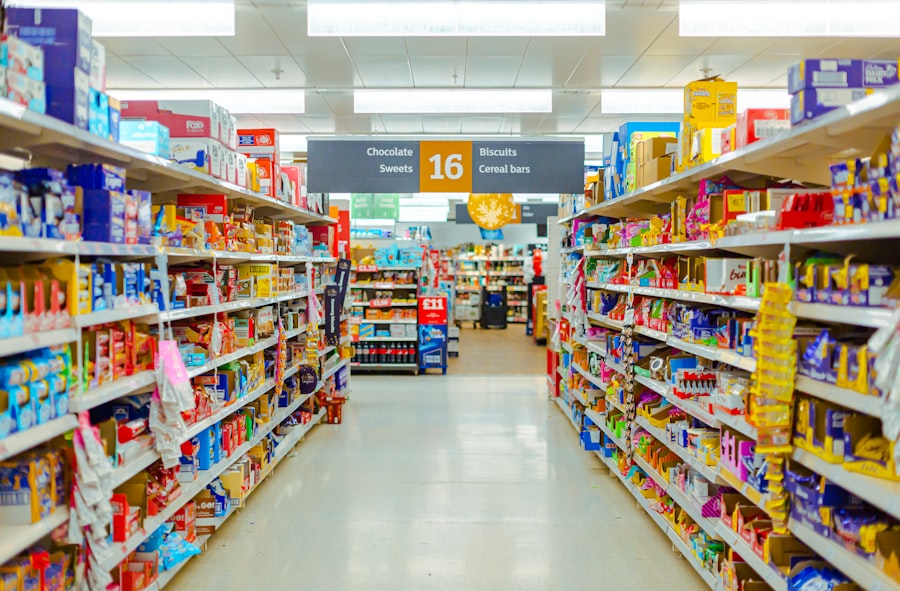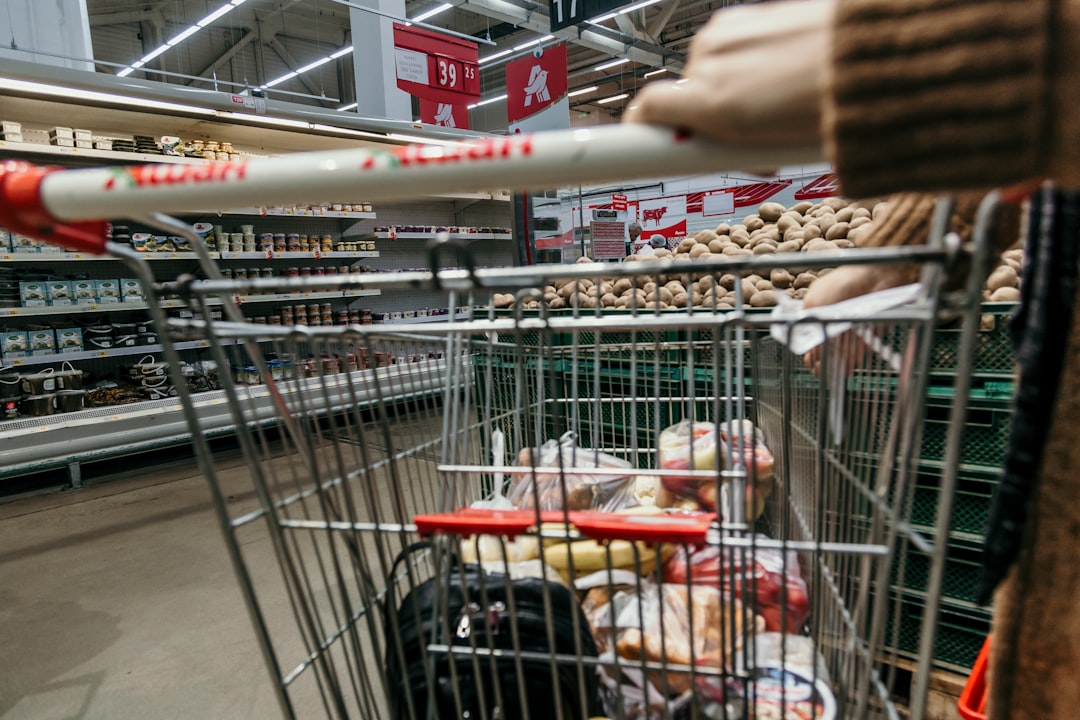In recent years, the grocery industry has been rocked by a scandal that has raised eyebrows and sparked outrage among consumers. Price fixing, a practice where companies collude to set prices at a certain level rather than allowing market forces to dictate them, has come to light in various sectors, but its impact on grocery stores is particularly concerning. You may have noticed that prices for everyday items seem to be rising without any clear justification.
This phenomenon is not merely a result of inflation or supply chain issues; it is often the result of unethical practices that undermine fair competition and consumer trust.
The scandal has exposed a web of deceit that not only affects your wallet but also raises questions about the integrity of the grocery industry as a whole.
With major players in the market implicated, the fallout from these revelations is likely to reshape the landscape of grocery shopping for years to come. Understanding the intricacies of this scandal is essential for you as a consumer, as it empowers you to make informed choices and advocate for fair practices in the marketplace.
Key Takeaways
- Price fixing scandal in grocery industry has serious implications for consumers and competition
- Consumers are negatively impacted by price fixing through higher prices and limited choices
- Grocery stores play a significant role in the scandal by colluding with suppliers to fix prices
- Legal ramifications for price fixing include hefty fines and potential jail time for executives involved
- Price fixing undermines competition in the grocery industry, leading to unfair market practices
How Price Fixing Affects Consumers
When you think about price fixing, it’s easy to see it as a distant corporate issue, but its effects are very much felt in your daily life. Price fixing leads to artificially inflated prices, meaning you end up paying more for groceries than you should. This practice can create a false sense of scarcity and urgency, making you believe that certain products are more valuable than they actually are.
As a result, your budget may stretch thinner, forcing you to make difficult choices about what to buy or even whether to buy at all. Moreover, price fixing can stifle innovation and quality in the products you purchase. When companies are not competing fairly, there is little incentive for them to improve their offerings or provide better service.
You might find that the quality of goods declines or that new products are slow to reach the shelves. In essence, price fixing not only robs you of your hard-earned money but also diminishes your overall shopping experience. The ramifications of this scandal are profound, affecting not just your finances but also the variety and quality of products available to you.
The Role of Grocery Stores in the Scandal

Grocery stores play a pivotal role in the price-fixing scandal, acting as both facilitators and victims of these unethical practices. Many large grocery chains have been accused of colluding with suppliers to set prices on essential items, creating an environment where competition is stifled. As a consumer, you may feel betrayed by these establishments that you trust to provide fair pricing and quality products.
The very places where you shop for your family’s needs become complicit in a system designed to exploit rather than serve. However, it’s important to recognize that not all grocery stores are involved in these practices. Some smaller, independent stores strive to maintain ethical pricing and transparency with their customers.
These businesses often rely on their reputation and community ties to attract customers, making them less likely to engage in price-fixing schemes. As you navigate your grocery shopping choices, consider supporting those stores that prioritize integrity over profit margins. By doing so, you can help foster a more competitive and fair marketplace.
The Legal Ramifications of Price Fixing
| Legal Ramifications of Price Fixing | Details |
|---|---|
| Criminal Charges | Individuals involved in price fixing can face criminal charges and potential imprisonment. |
| Civil Lawsuits | Companies engaged in price fixing can be sued by affected parties for damages. |
| Fines | Both individuals and companies can face significant fines for participating in price fixing activities. |
| Reputational Damage | Being found guilty of price fixing can lead to severe damage to the reputation of individuals and companies involved. |
The legal landscape surrounding price fixing is complex and fraught with challenges. When companies are caught engaging in this practice, they can face severe penalties, including hefty fines and legal action from both consumers and government agencies. As a consumer, you may wonder how these legal ramifications affect you directly.
While it may seem like a distant issue, the outcomes of these cases can lead to changes in pricing structures that ultimately impact your shopping experience. In many jurisdictions, price fixing is considered a violation of antitrust laws designed to promote fair competition. If companies are found guilty, they may be required to pay restitution to affected consumers or even change their business practices entirely.
This legal scrutiny serves as a reminder that unethical behavior will not go unpunished, but it also highlights the importance of consumer vigilance. By staying informed about ongoing legal cases and advocating for fair practices, you can play an active role in shaping the future of the grocery industry.
Impact on Competition in the Grocery Industry
Price fixing has far-reaching consequences for competition within the grocery industry. When major players collude to set prices, smaller competitors struggle to survive in an environment where they cannot compete on equal footing. This lack of competition can lead to fewer choices for you as a consumer, as smaller stores may be forced out of business or unable to expand their offerings.
The result is a homogenized market where only a few large chains dominate, limiting your options and potentially leading to higher prices. Furthermore, when competition diminishes, innovation often suffers as well. Companies that engage in price fixing may become complacent, focusing on maintaining their collusive agreements rather than improving their products or services.
This stagnation can lead to a lack of diversity in the types of goods available on store shelves, ultimately impacting your shopping experience. As a consumer, it’s crucial to recognize the importance of supporting competition within the grocery industry—not just for better prices but also for a wider array of quality products.
Response from Government Agencies

In response to the growing concerns surrounding price fixing in the grocery industry, government agencies have begun taking action to investigate and address these unethical practices. Regulatory bodies such as the Federal Trade Commission (FTC) in the United States have ramped up their efforts to monitor pricing behaviors and enforce antitrust laws. As a consumer, this increased scrutiny can provide some reassurance that steps are being taken to protect your interests.
However, while government intervention is essential, it is not always swift or comprehensive enough to address the scale of the problem. Investigations can take time, and by the time action is taken, consumers may have already suffered from inflated prices and limited choices. It’s important for you to stay informed about these developments and advocate for stronger regulations that hold companies accountable for their actions.
Your voice can contribute to pushing for more robust protections against price fixing and other unethical practices.
Consumer Advocacy Groups’ Reactions
Consumer advocacy groups have been vocal in their condemnation of price fixing within the grocery industry. These organizations work tirelessly to raise awareness about unethical practices and push for reforms that protect consumers like you from exploitation. They often conduct research, publish reports, and mobilize grassroots campaigns aimed at holding companies accountable for their actions.
As a consumer, you can benefit from engaging with these advocacy groups by staying informed about their findings and recommendations. Many organizations offer resources that help you understand your rights as a consumer and provide guidance on how to report suspected price-fixing activities. By aligning yourself with these groups, you can amplify your voice and contribute to a collective effort aimed at fostering transparency and fairness in the grocery market.
Steps Taken by Grocery Stores to Address the Scandal
In light of the price-fixing scandal, many grocery stores have begun implementing measures aimed at restoring consumer trust and ensuring compliance with ethical pricing practices.
This shift towards transparency can help reassure you that you are being treated fairly as a consumer.
Additionally, some grocery stores are investing in training programs for their employees focused on ethical business practices and compliance with antitrust laws. By fostering a culture of integrity within their organizations, these stores aim to prevent future incidents of price fixing and demonstrate their commitment to fair competition. As you shop at these establishments, look for signs of their efforts—whether through marketing materials or employee interactions—that indicate they prioritize ethical practices over profit.
Potential Consequences for Executives Involved in Price Fixing
The consequences for executives involved in price-fixing schemes can be severe and far-reaching. Legal repercussions may include hefty fines or even imprisonment for those found guilty of orchestrating or participating in collusion. As a consumer, it’s important to understand that accountability extends beyond just the companies involved; individuals who engage in unethical practices can face personal consequences as well.
These potential repercussions serve as a deterrent against future misconduct within the industry. When executives know they could face serious penalties for their actions, they may think twice before engaging in price-fixing schemes that harm consumers like you. This accountability is crucial for fostering an environment where ethical business practices are prioritized over short-term profits.
How Consumers Can Protect Themselves from Price Fixing
As a savvy consumer, there are several steps you can take to protect yourself from the effects of price fixing in the grocery industry. First and foremost, staying informed about pricing trends can help you identify when prices seem unusually high or inconsistent with market norms. By comparing prices across different stores and keeping an eye on sales promotions, you can make more informed purchasing decisions.
Additionally, consider supporting local businesses and independent grocery stores that prioritize ethical practices over profit margins. These establishments often rely on community support and are less likely to engage in collusive behavior compared to larger chains. By choosing where you shop wisely, you can contribute to a more competitive marketplace while also ensuring that your purchasing power is respected.
The Future of Grocery Stores in the Wake of the Scandal
The future of grocery stores in light of the price-fixing scandal remains uncertain but holds potential for positive change if consumers remain vigilant and engaged. As awareness grows about unethical practices within the industry, there is an opportunity for reform that prioritizes transparency and fair competition. You have the power to influence this change by advocating for ethical business practices and supporting stores that align with your values.
Moreover, as regulatory bodies continue to crack down on price fixing and hold companies accountable for their actions, there is hope for a more equitable marketplace where consumers like you can shop with confidence. The lessons learned from this scandal could pave the way for stronger regulations and greater accountability within the grocery industry—ultimately benefiting everyone involved from producers to consumers alike. In conclusion, understanding the intricacies of the price-fixing scandal empowers you as a consumer to make informed choices while advocating for fairness within the grocery industry.
By staying informed about ongoing developments and supporting ethical businesses, you can contribute to creating a marketplace that prioritizes integrity over profit at every level.
In recent years, the grocery industry has been rocked by a series of price-fixing scandals, where major retailers have been accused of colluding to artificially inflate prices on essential goods. This unethical practice not only undermines consumer trust but also distorts market competition. An insightful article on this topic can be found on How Wealth Grows, which delves into the implications of such scandals on both the economy and consumer behavior. For a deeper understanding, you can read more about it here.
WATCH NOW! How Algorithms Quietly Bloat Your Grocery Bill; Here’s How to Fight Back
FAQs
What is a price fixing scandal in grocery stores?
A price fixing scandal in grocery stores occurs when competing grocery retailers collude to artificially inflate prices on certain products, thereby eliminating competition and maximizing profits.
How does price fixing affect consumers?
Price fixing can lead to higher prices for consumers, as it eliminates the benefits of competition and forces consumers to pay inflated prices for goods and services.
What are the legal implications of price fixing in grocery stores?
Price fixing is illegal under antitrust laws in many countries, including the United States and the European Union. Companies found guilty of price fixing can face significant fines and legal consequences.
How are price fixing scandals investigated?
Price fixing scandals are typically investigated by government regulatory agencies, such as the Federal Trade Commission (FTC) in the United States or the Competition and Markets Authority (CMA) in the United Kingdom. These agencies have the authority to conduct investigations and impose penalties on companies found to be engaging in price fixing.
What are the consequences for grocery stores involved in price fixing scandals?
Grocery stores involved in price fixing scandals can face severe financial penalties, damage to their reputation, and potential legal action from affected consumers. In some cases, executives and employees involved in the price fixing scheme may also face criminal charges.
